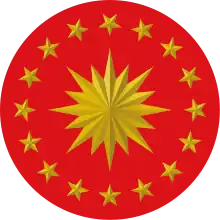Süleyman Demirel
Sami Süleyman Gündoğdu Demirel (Turkish pronunciation: [sylejˈman dem'iɾæl]; 1 November 1924 – 17 June 2015)[1] was a Turkish politician, engineer, and statesman who served as the 9th President of Turkey from 1993 to 2000. He previously served as the Prime Minister of Turkey seven times between the years 1965 and 1993. He was the leader of the Justice Party (AP) from 1964 to 1980 and the leader of the True Path Party (DYP) from 1987 to 1993.
Süleyman Demirel | |
|---|---|
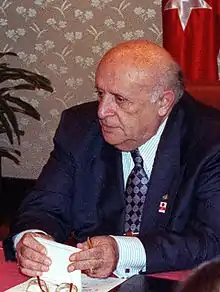 | |
| 9th President of Turkey | |
| In office 16 May 1993 – 16 May 2000 | |
| Prime Minister | Tansu Çiller Necmettin Erbakan Mesut Yılmaz Bülent Ecevit |
| Preceded by | Turgut Özal |
| Succeeded by | Ahmet Necdet Sezer |
| 12th Prime Minister of Turkey | |
| In office 20 November 1991 – 16 May 1993 | |
| President | Turgut Özal |
| Deputy | Erdal İnönü |
| Preceded by | Mesut Yılmaz |
| Succeeded by | Erdal Inönü (acting) |
| In office 12 November 1979 – 12 September 1980 | |
| President | Fahri Korutürk |
| Preceded by | Bülent Ecevit |
| Succeeded by | Bülend Ulusu |
| In office 21 July 1977 – 5 January 1978 | |
| President | Fahri Korutürk |
| Deputy | Necmettin Erbakan Alparslan Türkeş |
| Preceded by | Bülent Ecevit |
| Succeeded by | Bülent Ecevit |
| In office 31 March 1975 – 21 June 1977 | |
| President | Fahri Korutürk |
| Deputy | Necmettin Erbakan Turhan Feyzioğlu Alparslan Türkeş |
| Preceded by | Sadi Irmak |
| Succeeded by | Bülent Ecevit |
| In office 21 October 1965 – 16 March 1971 | |
| President | Cemal Gürsel Cevdet Sunay |
| Preceded by | Suat Hayri Ürgüplü |
| Succeeded by | Nihat Erim |
| Deputy Prime Minister of Turkey | |
| In office 20 February 1965 – 21 October 1965 | |
| Prime Minister | Suat Hayri Ürgüplü |
| Preceded by | Kemal Satır |
| Succeeded by | Atilla Karaosmanoğlu Sadi Koçaş (1971) |
| Leader of the True Path Party | |
| In office 24 September 1987 – 16 May 1993 | |
| Preceded by | Hüsamettin Cindoruk |
| Succeeded by | Tansu Çiller |
| Leader of the Justice Party | |
| In office 28 November 1964 – 16 October 1981 | |
| Preceded by | Ragıp Gümüşpala |
| Succeeded by | Party abolished |
| Member of the Grand National Assembly | |
| In office 29 November 1987 – 16 May 1993 | |
| Constituency | Isparta (1987, 1991) |
| In office 10 October 1965 – 12 September 1980 | |
| Constituency | Isparta (1965, 1969, 1973, 1977) |
| Personal details | |
| Born | Süleyman Gündoğdu Demirel 1 November 1924 Atabey, Turkey |
| Died | 17 June 2015 (aged 90) Ankara, Turkey |
| Cause of death | Respiratory failure |
| Resting place | Atabey, Turkey |
| Nationality | Turkish |
| Political party | Justice Party, True Path Party (now Democratic Party) |
| Spouse(s) | |
| Alma mater | Istanbul Technical University |
| Profession | Civil engineer |
| Signature | |
Having been identified as a potential future Prime Minister by Adnan Menderes, Demirel was elected leader of the Justice Party in 1964 and managed to bring down the government of İsmet İnönü in 1965 despite not being a Member of Parliament. He supported the government of Suat Hayri Ürgüplü until his party won a parliamentary majority in 1965. He became the first Prime Minister born in the Republic of Turkey. Claiming that his Justice Party was the successor of the banned Democrat Party, he was re-elected as premier in 1969 by winning a parliamentary majority for a second time. Despite his economic reforms which stabilised inflation, he resigned after his budget was blocked by parliament, but formed his third government shortly after. His premiership came to an end following the 1971 Turkish coup d'état.
Demirel was the leader of the opposition from 1971 to 1975 before forming a right-wing government known as the First Nationalist Front, which collapsed in 1977. He formed the Second Nationalist Front cabinet in 1977, which collapsed in 1978. Demirel's minority government in 1979 was unable to elect a president in 1980, leading to the 1980 Turkish coup d'état which banned Demirel from politics. In the 1987 constitutional referendum, he regained the right to actively participate in politics and assumed the leadership of the True Path Party. He won the 1991 general election and formed a coalition with the Social Democratic Populist Party (SHP), assuming his fifth and final term as Prime Minister. Following the sudden death of serving President Turgut Özal, Demirel contested the 1993 presidential election and subsequently became the ninth President of Turkey until 2000. With 10 years and 5 months, his tenure as premier is the third longest in Turkish history, after İsmet İnönü and Recep Tayyip Erdoğan.
Family
Sami Süleyman Gündoğdu was born on 1 November 1924, İslamköy, Atabey, a town in Isparta Province to Hacı Yahya Demirel (1893-1972) and Hacı Ümmühan Demirel (1902-1979). He was a shepherd in his childhood. Upon completion of his elementary school education in his hometown, he attended middle school and high school in Isparta, Muğla, and Afyon. In 1948, he married Nazmiye (Şener) Demirel, his second cousin.
Engineering career
After graduating from the school of civil engineering at the Istanbul Technical University in 1949,[2] Süleyman Demirel worked in the State Department for electrical power planning. He undertook postgraduate studies on irrigation, electrical technologies and dam construction in the United States, first in 1949–1950, then in 1954–1955. During the construction of the Seyhan Dam, Demirel worked as a project engineer and in 1954 was appointed Director of the Department of Dams. In 1955, he served as Director General of the State Hydraulic Works (DSİ). As such, Demirel supervised the construction of a various power plants, dams and irrigation facilities.[2] Eisenhower Fellowships selected Süleyman Demirel in 1954 to represent Turkey.[3]
After the 1960 coup d'état, he was drafted to the Turkish Army for compulsory military service.[2] Upon completion of his military service, he worked as a freelance engineer and a representative of Morrison Construction, a U.S. company. During this period, he also worked as a part-time lecturer of hydraulic engineering at the Middle East Technical University (ODTÜ) in Ankara.[4]
Entry to politics
His political career started with his election to the executive board of the Justice Party,[4] founded by the former General Ragıp Gümüşpala under directions from Head of State Cemal Gürsel, as a replacement of the Democrat Party that folded after the military coup of 27 May 1960. Journalist and MP Cihat Baban claims in The Gallery of Politics (Politika Galerisi), that Cemal Gürsel told him:
We may solve all troubles if Süleyman Demirel can become the head of the Justice Party (Adalet Partisi). I am working very hard for him to become the party leader. If I succeed in this, I will be happy.[5]
With his Turkish with a rural, central Anatolian accent and the fact that he came from a village from the countryside, he was able to capture the masses which were often present at the campaign rallies he held and present himself as one of theirs.[6]
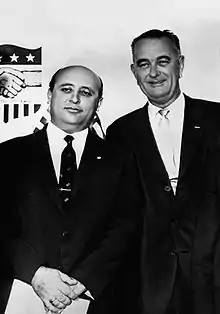
On 22 March 1963, the imprisoned former President Celal Bayar was released on parole, causing protests in front of Justice Party headquarters. Demirel resigned from his position, claiming that "There wouldn't be democracy in this country for another 50 years". He remained inactive until the death of Ragıp Gümüşpala, when, in June 1964, he re-entered politics as a candidate for chairman of the Party. However, Demirel faced strong opposition. His biggest rival was Sadettin Bilgiç, nicknamed "koca reis" ("big captain" in English). Bilgiç supporters accused Demirel of being a freemason; however, Demirel averted the crisis with a lie. Instead of writing to his own lodge, he petitioned a separate freemason's lodge asking whether he was a member or not. As expected, the lodge chairman answered negatively. This turned the tide in Demirel's favor, and he received enough votes to become the Chairman of the Party.[2]
Demirel was elected chairman at the second grand party convention on 28 November 1964. He facilitated the formation of a caretaker government that ruled between February and October 1965 under the premiership of Suat Hayri Ürgüplü in which he served as Deputy Prime Minister. Under his leadership, the Justice Party won an unprecedented majority of the votes in the 1965 general election and formed a majority government. Demirel thus became the youngest-ever Prime Minister in Turkish history at the age of 40.[7]
First premiership
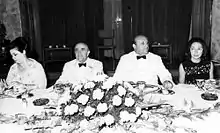
Demirel was one of the first of a new generation born in the 1920s that were now entering politics known as the "Republican Generation", during which heroes of the Turkish War of Independence such as İsmet İnönü, Celâl Bayar and Ragıp Gümüşpala were gradually withdrawing from politics.
Shortly after coming to power, the first crisis that he faced was the "Presidential crisis" after Cemal Gürsel, who assumed the presidency after the adoption of the 1961 Constitution, stated that his health prevented him from continuing his duty. The Chief of the General Staff, Cevdet Sunay, was nominated for the presidency by Demirel in order to soften the army's attitude towards the Justice Party.[8] Sunay retired voluntarily on March 15, 1966 was elected as the fifth president of Turkey by the Grand National Assembly on March 28, 1966.
In the next elections on 10 October 1969, his party was the sole winner by a landslide once again. Demirel presided over the laying the foundations of the Keban Dam, the Bosphorus Bridge and an oil pipeline between Batman and İskenderun. Economic reforms stabilized inflation, and Turkey became one of the fastest growing economies. However increasing amounts of boycotts and strikes by university students in 1968 began political instability which especially concerned the Turkish military. Pressure was also mounting from the United States, as the Nixon Administration wished for Turkey to ban the cultivation of opium, which would have been costly politically for Demirel to implement. Demirel also had trouble brewing inside his own party, as while he attempted to issue an amnesty to ex-Democrats, he was effectively vetoed by the Turkish military (see 1969 Turkish Military Intervention). As a result, in 1970, several ex-DP deputies left the Justice Party to found the Democratic Party, while the Islamists also left to found the National Order Party under Necmettin Erbakan.
The chaotic seventies
1971 Memorandum
A worsening economy, the 15-16 June events, one of the biggest workers protests in the history of Turkey; disagreements between the government and military over the Cyprus dispute, escalations of tensions with Greece, and conflict between leftists and rightists served to define the last years of Demirel's first premiership as politically unstable. He blamed the liberal constitution for the crisis. He resigned as Prime Minister after his budget was blocked by parliament, but formed his third government shortly after. A military coup attempt by National Democratic Revolutionaries on 9 March 1971 finally resulted in a direct military intervention on 12 March, and Demirel resigned for a military supported government under Nihat Erim.
The constitutional amendments that Demirel wished for were implemented during technocratic military governance which relied on support from parliament. In the spring of 1973, with the presidential election on the agenda, he reached an agreement with the new leader of the Republican People's Party (CHP), Bülent Ecevit, to support Fahri Korutürk as president instead of Faruk Gürler.
Nationalist Front governments
With the Justice Party emerging second in the 1973 general election, a grand CHP-AP coalition was expected. However, Demirel declared that "We can only come together in war." CHP instead formed a coalition with Erbakan's new Islamist party, the National Salvation Party (MSP).[9] Ecevit's government carried out the Cyprus Operation, but ideological conflicts in the government prompted Ecevit to resign on September 18, 1974 to hold early elections. However early elections never happened, and instead caused a government crisis that lasted for more than 200 days from September 1974 to March 1975. After the caretaker government of Sadi Irmak, on March 31, 1975, under the leadership of Demirel, a right-wing coalition government was established consisting of the Justice Party, MSP, the Nationalist Movement Party (MHP), and the Republican Reliance Party that was known as the "First Nationalist Front". In order for the coalition to survive, Islamist MSP suppporters and ultranationalist MHP members were recruited within state institutions, intensifying the renewed political violence of the 1970s. 42 people were killed in the Taksim Square massacre. The country entered an economic depression caused by a rise in global petrol prices, deficit in foreign payments and rapid inflation. Süleyman Demirel's nephew, Yahya Kemal Demirel, was arrested for corruption after an investigation by the journalist Uğur Mumcu during the government.
Despite gaining support in the 1977 elections the Justice Party again lost to CHP, which received 41.4 percent of the vote. However, Ecevit was not able to form a government, so Demirel became prime minister again, forming the Second Nationalist Front with only MSP and MHP. This government was fell in a no-confidence vote on December 31, 1977 in what was known as the Güneş Motel Incident, where 13 Justice Party MPs defected from their party to support a CHP government where they received cabinet positions. Demirel refused to establish a dialogue with the CHP-dominated government and conducted a vicious opposition to Ecevit, and constantly referred to him as "head of government" instead of "prime minister". On February 1, 1979, Demirel said "In no country in the world, could such a government with 1200 deaths, 70% inflation, disrepute, cruelty, torture, unjust and merciless partisanship stand for even one day. A cadre that has exceeded its ambition has usurped the administration." On February 21, 1979, he announced to President Korutürk that they were against the extension of martial law.

The troubles brought by American embargo, inflation and escalating political violence meant Ecevit lost the 1979 by-elections, prompting his resignation. Demirel returned as prime minister, and established a minority government due to the negative atmosphere created by the Nationalist Front governments (MSP and MHP still provided confidence). His last premiership before the 1980 coup saw the implementation of the 24 January Decisions suggested by the international credit institutions, and appointed Turgut Özal as his Undersecretary, which proved to be a turning point in Turkey's transition to a neoliberal economy. With political violence and assassinations at an all time high, top military generals delivered a memorandum to President Korutürk, urging for politicians to put aside their difference to solve the country's problems, but this memerandum did nothing to get Demirel and Ecevit to cooperate. With Fahri Korutürk's presidential term ending, a crisis brewed as to who would succeed him, with Demirel and Ecevit failing 115 times to elect a new president. Demirel's government lasted until the coup of 12 September 1980, which banned him from politics.[10]
Demirel opened 268 İmam Hatip schools in his premierships between 1965–1980 becoming one of the politicians who opened the most İmam Hatip schools.[11]
Ban from politics
With the military coup on 12 September 1980, Demirel's prime ministry ended and he was kept under surveillance in Hamzaköy, Gelibolu for about a month (13 September-11 October 1980). He did not resign as chairman of the Justice Party until it was dissolved on October 16, 1981. With the provisional article 4 of the 1982 Constitution, which was accepted in the November 7 1982 referendum, he and most politicians were banned from politics for 10 years. However, he maintained ties with his party's former leaders. After political parties were allowed to be established in May 1983, Demirel said, "I do not build shanty houses on my land with a title deed." He did not support the party that the military administration tried to have Bülend Ulusu founded, the Nationalist Democracy Party, nor the Motherland Party (ANAP) led by his protégé Turgut Özal. On May 20, 1983, the Great Turkey Party (BTP) was established, but it was swiftly banned by the National Security Council on the grounds that it was a continuation of the Justice Party. Demirel, along with former CHP and Justice Party members was forced to stay for four months in Zincirbozan, Çanakkale, on the grounds that he violated the political ban.
Last premiership
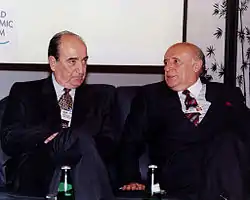
In 1986, Demirel launched a national campaign for the lifting of pre-1980 politicians' political bans and initiated a referendum on the issue.[12] Only 18 days after his political ban was rescinded, he was elected chairman at the extraordinary convention of the True Path Party (DYP), another successor party to the Justice Party. He was re-elected Deputy of Isparta at the elections of 29 November 1987.[12]
Following the 1991 general election, Süleyman Demirel became Prime Minister once again in a coalition government with the Social Democratic Populist Party. Demirel acknowledged the distinction of Kurds being a different ethnicity from Turks,[13] reformed criminal procedure law, removed the ban on all party names and abbreviations accumulated from military coups, and ratified international conventions on trade union freedoms. The "Green Card" social security program was also established[14] and the age requirement for retirement was abolished.[15] While the government had success combating far-left terrorist groups, the assassinations of journalist Uğur Mumcu and Gendarme commander Eşref Bitlis shocked the country. Though both coalition partners advocated for ending the OHAL zone and the village guard system in southeast Anatolia, Operation Provide Comfort meant the policies had to continue in the unstable region.
During this period, he carried out a strong opposition to his protégé and soon president, Turgut Özal, with whom he prepared the 24 January Decisions.
Presidency
After the sudden death Özal, Demirel became the ninth President of Turkey on 16 May 1993, elected by the Grand National Assembly of Turkey. Resigning his party chairmanship, his successor for leadership of DYP became Turkey's first female prime minister, Tansu Çiller.
President Demirel drew backlash from statements he made in the aftermath of the Sivas Massacre in which 35 intellectuals lost their lives when they were trapped in a burning hotel by a mob, which took place just one and a half months after he became President. He said "The incident is an isolated incident. There was heavy provocation. As a result of this provocation, the people were agitated... The security forces did their best... There was no conflict between the groups. There was loss of life due to the burning of the hotel.”
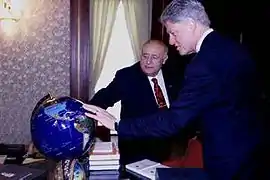
Demirel gave Azerbaijani President Heydar Aliyev advanced notice of an upcoming coup attempt against his government backed by various factions of the Turkish army and intelligence services. He survived an assassination attempt in 1996 in a ribbon-cutting ceremony to open a shopping mall in İzmit. The would be assassin, İbrahim Gümrükçüoğlu said in his defence that he did not intend to kill the President, but that he intended to shoot into the air with his pistol to protest Turkey's military cooperation agreement with Israel. Doctors later diagnosed Gümrükçüoğlu with paranoia.
Some accused Demirel of being the leading the effort to bring down Necmittin Erbakan's REFAHYOL government in what became known as the "Postmodern Coup"[16] while others claimed that he prevented a complete military takeover by easing the tension. He did not give the governing mandate back to Tansu Çiller, but instead to ANAP chairman Mesut Yılmaz, even though Welfare Party, DYP and BBP opposed the move.[17]
In 1997, he participated in a conference organized by the Journalists and Writers Foundation, of which Fethullah Gülen was its honorary chairman, and received the "Statesman National Reconciliation Award" from Gülen.[18]
Though there was an attempt to extend his presidential term by another five years, Demirel stepped down from the presidency on April 5. He handed over his duty to Ahmet Necdet Sezer on 16 May 2000. With his retirement from politics, his overall tenure as Prime Minister was shorter than only İsmet İnönü's and Recep Tayyip Erdogan's.
Later life and death
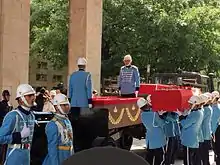
Following retirement from politics, Demirel was a frequent panelist and speaker at several places, mostly in universities, within Turkey. His wife Nazmiye passed away on May 27, 2013 in the hospital where she was treated for Alzheimer's. He died on 17 June 2015 at the Güven hospital in Ankara where he had been undergoing treatment for a respiratory tract infection. After the state ceremony in the Turkish Grand National Assembly and a religious ceremony at Kocatepe Mosque on 19 June 2015, Demirel's body was taken to his hometown of Atabey, Isparta in the place allocated as a mausoleum.[19] In 2019, the Süleyman Demirel Mausoleum was completed and opened to visitors.
Legacy
Demirel achieved many firsts throughout his political career. He formed the most governments (7), was longest serving prime minister in Turkish political history following İsmet İnönü and Recep Tayyip Erdoğan, and was the youngest prime minister at the age of 41. He also broke the records for the youngest politician to become a party leader at the age of 40, and the youngest general manager appointed to a public institution at the age of 30.[20][21]
He was also accused of deviating from the principles of Mustafa Kemal Atatürk, which he denied.
The Süleyman Demirel Airport and Süleyman Demirel University, both of which are in Isparta are named after him. So are the Süleyman Demirel Stadium in Antalya, the Süleyman Demirel Medical Centre of the Atatürk University in Erzurum and Suleyman Demirel University in Kazakhstan. There are also two important main streets named after him: one in Istanbul and the other in Muğla. On 26 October 2014 Süleyman Demirel Democracy and Development Museum was opened in Isparta.[22]
In popular culture
Süleyman Demirel was often nicknamed Baba (The Father) or Çoban Sülü (Sülü the Shepherd) and humorously Spartacus, after his native city of Isparta. His fedora hat was a famous part of his image.[23][24]
With the song "Demirbaş" in the album "Yadigâr" (1995), Fikret Kızılok humorously described Demirel's inability to stay away from the political scene. "Süleyman", one of the hit songs of Barış Manço's 1992 album "Mega Manço", was another satire of Demirel. He was portrayed by Haldun Boysan in the 2007 movie "Zincirbozan". There are also references to Demirel in Cem Karaca's "Raptiye". Süleyman Demirel also appeared as a guest actor in the film "The President in the Other Turkey". Nejmi Aykar portrayed Demirel in the TV series Once Upon a Time in Cyprus, which was broadcast on TRT 1.
Although Demirel had retired, whenever there was political distress, Turkish media or his followers (humorously or otherwise) called on him with the words "Kurtar bizi baba" ("Father, save us"). He is well known for uttering phrases such as "Dün dündür, bugün bugündür" ("Yesterday is yesterday, today is today"), usually said when he has changed his stand on a subject. Another example is "Benzin vardı da biz mi içtik?" ("Did we drink the gasoline, as if there were any?"), said when defending his actions during the 1970s energy crisis.[25] When the question of criminalizing sex work came to question by the increased popularity of conservative movements, he responded "Genelevleri kapatalım da millet bizi mi siksin?" ("Should we close the brothels so people can fuck us?").[26]
Awards
 Poland :
Poland :  Order of the White Eagle, 28 October 1993
Order of the White Eagle, 28 October 1993 Azerbaijan :
Azerbaijan :  Istiglal Order, 12 June 1999[27]
Istiglal Order, 12 June 1999[27] Croatia :
Croatia :  Grand Order of King Tomislav, 7 July 1994[28]
Grand Order of King Tomislav, 7 July 1994[28] Italy :
Italy :  Order of Merit of the Italian Republic, 7 October 1996
Order of Merit of the Italian Republic, 7 October 1996 Estonia :
Estonia :  Order of the Cross of Terra Mariana, 1997
Order of the Cross of Terra Mariana, 1997 Romania :
Romania :  Order of the Star of Romania, 1999
Order of the Star of Romania, 1999 Georgia :
Georgia :  Order of the Golden Fleece, 1999
Order of the Golden Fleece, 1999 Germany :
Germany :  Order of Merit of the Federal Republic of Germany, 6 April 2000
Order of Merit of the Federal Republic of Germany, 6 April 2000
See also
References
- Sarı, Eren (25 December 2016). "Çoban Sülü: Türk siyasetinin son 50 yılına fötr şapkası ve renkli kişiliğinin yanı sıra, hiç çocuğu olmadığı halde 'Baba' lakabıyla damga vuran 9. Cumhurbaşkanı Süleyman Demirel, "Akşam olunca kapısını kilitlemeden yatabilen, sabaha karşı kapıyı çalanların polis olmadığını düşünen bir Türkiye" hayaliyle aramızdan ayrıldı". Noktaekitap. Retrieved 6 December 2018 – via Google Books.
- Arslanbenzer, Hakan (19 June 2015). "Süleyman Demirel: Dream for a 'Great Turkey'". Daily Sabah. Retrieved 20 June 2015.
- Kinzer, Stephen (16 June 2015). "Suleyman Demirel, Seven Times Turkey's Prime Minister, Dies at 90". The New York Times. Retrieved 20 June 2015.
- "Süleyman DEMİREL". Turkish Ministry of Foreign Affairs. Archived from the original on 25 March 2014. Retrieved 20 June 2015.
- Baban, Cihad (2009). Politika galerisi (in Turkish). Istanbul: Timaş. ISBN 978-9752639669.
- Heper, Metin; Landau, Jacob M. (1991). Political Parties and Democracy in Turkey. I.B. Tauris. pp. 189–191. ISBN 1-85043-300-3.
- Akkoc, Raziye (17 June 2015). "Suleyman Demirel, former Turkish president, dies at 90". The Daily Telegraph. Retrieved 20 June 2015.
- Berkan, İsmet (22 December 2006). "Demirel 1966'da neden cumhurbaşkanı olmadı?". Radikal. Archived from the original on 5 October 2013.
{{cite web}}: CS1 maint: unfit URL (link) - "12 Eylül Belgeseli 1. Bölüm | Renklerin Çatışması | 32.Gün Arşivi". YouTube. 30 August 2017. Archived from the original on 19 November 2019.
- Barchard, David (17 June 2015). "Süleyman Demirel obituary". theguardian.com. Retrieved 20 June 2015.
- Öcal, Mustafa. "DÜNDEN BUGÜNE İMAM HATİP LİSELERİ (1913-2013), 100. YILINDA İMAM HATİP LİSELERİ". Academia. Archived from the original on 20 May 2021.
- "Archived copy". Archived from the original on 12 September 2017. Retrieved 12 September 2017.
{{cite web}}: CS1 maint: archived copy as title (link) - Bila, Fikret (17 August 2005). "Demirel'in 'Kürt realitesi' ile Erdoğan'ın 'Kürt sorunu'". Milliyet. Archived from the original on 5 October 2013.
{{cite web}}: CS1 maint: unfit URL (link) - Hatun, Şükrü. ""Yeşil Kart"a dokunmayın!". Türk Tabipler Birliği. Archived from the original on 5 October 2013.
- Tezel, Ali (5 October 2010). "HABERTÜRK-Yaşı bekleyenlere bir defalık emeklilik hakkı gelir mi?". Ali Tezel. Archived from the original on 9 February 2014.
{{cite web}}: CS1 maint: unfit URL (link) - "Arınç Demirel'i hedef aldı: 28 Şubat'ın başaktörü". Ulusal Kanal. Archived from the original on 5 November 2013.
{{cite web}}: CS1 maint: unfit URL (link) - Türk, Alican (21 June 1997). REFAHYOL HÜKÛMETİ'NİN İSTİFASI İLE İLGİLİ BASIN AÇIKLAMASI - 21 Haziran 1997 (Video) (in Turkish).
- Demirel'den Fetullah Gülen'e övgüler! (Video) (in Turkish). Yeni Akit Gazetesi.
- "Turkey's ninth president Suleyman Demirel passes away". Anadolu Agency. 17 June 2015. Retrieved 20 June 2015.
- "Başbakan Menderes'in rekorunu geçti". Sabah. 19 March 2013. Archived from the original on 30 May 2016.
- "Süleyman DEMİREL". Republic of Türkiye Ministry of Foreign Affairs. Archived from the original on 17 July 2013.
{{cite web}}: CS1 maint: unfit URL (link) - "Sleyman Demirel Demokrasi ve Kalknma Mzesi ald". Radikal (in Turkish).
- Anadolu Agency. "Turkey's 9th President Suleyman Demirel dies at 91". Getty Images.
- "HATS: A POLITICAL SYMBOL OF TURKISH HISTORY". Ekrembugraekinci.com. Retrieved 27 November 2017.
- "Süleyman Demirel - Benzin vardı da biz mi içtik?".
- "Asla Unutulmayacak Sözleri Ve Kararları ile Süleyman Demirel".
- "Türkiyə Cümhuriyyətinin Prezidenti Süleyman Dəmirəlin "İstiqlal" ordeni ilə təltif edilməsi haqqında haqqında AZƏRBAYCAN RESPUBLİKASI PREZİDENTİNİN FƏRMANI" [Order of the President of Azerbaijan Republic on awarding President of Turkey Suleyman Demiral with Istiglal Order] (in Turkish). Archived from the original on 15 March 2012. Retrieved 20 January 2011.
- "Untitled Document". Royalcroatia.tripod.com. Retrieved 6 December 2018.
